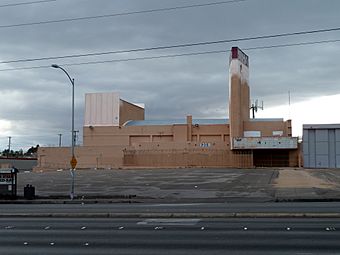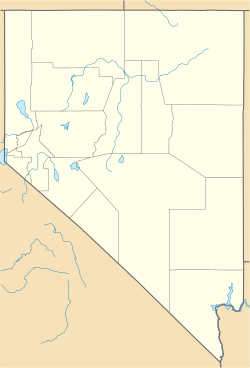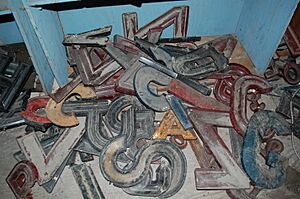Huntridge Theater facts for kids
Quick facts for kids |
|
|
Huntridge Theater
|
|

Huntridge Theater in 2010
|
|
| Location | 1208 E. Charleston Blvd. Las Vegas, Nevada |
|---|---|
| Area | 2 acres (0.81 ha) |
| Built | 1944 |
| Built by | Pioneer Construction Co. |
| Architect | Lee, S. Charles |
| Architectural style | Moderne; International |
| NRHP reference No. | 93000686 |
| Added to NRHP | July 22, 1993 |
The Huntridge Theater, also known as the Huntridge Performing Arts Theater, is a cool building in Las Vegas, Nevada. It's designed in a style called Streamline Moderne, which looks very sleek and modern. This theater is so special that it's listed on the United States National Register of Historic Places. A famous architect named S. Charles Lee designed it.
The Huntridge Theater first opened its doors in 1944 as a movie theater. Over the years, it also became a place for live stage shows and music concerts. After being empty for almost 17 years, the Huntridge was bought in 2021. It has since been fully remodeled and reopened to the public, bringing back its historic charm.
Contents
History of the Huntridge Theater
The story of the Huntridge Theater began on April 6, 1944. That's when the Las Vegas Review-Journal newspaper announced that construction was starting. The theater officially opened on October 10, 1944. It was a big deal, with 950 seats and awesome movie projectors. These projectors were made with incredible precision to help people avoid eye strain!
The theater was first run by the Commonwealth Theater Company. Later, the Huntridge Theater Company, led by Thomas Oakey, took over. The land where the theater stands was once owned by a rich businessman named Leigh S. J. Hunt. He left it to his son, Henry Leigh Hunt, in 1933. Both the Huntridge Theater and the neighborhood around it are named after the Hunt family.
Huntridge Theater in the 1950s
In 1951, a company called Nevada Theater Corp. started managing the Huntridge Theater. The manager, Lloyd Katz, made an important change: he allowed people of all backgrounds to attend, making the theater open to everyone. Many kids who grew up in the area remember Mr. Katz fondly. He offered a special 25-cent admission for children on Saturday mornings. These "Kiddie Matinees" showed fun movies like Disney cartoons, Roy Rogers westerns, and Looney Tunes animated shorts.
In 1963, the Huntridge Theater hosted a very special event. It was the world premiere of the movie Love Is a Ball. This means it was the first time anyone in the world got to see that film!
Changes and Challenges
Frank Silvaggio bought the theater in 1977. In 1980, the theater was changed to have two screens instead of one big one. But in 1992, Richard Lenz leased the theater. He removed the dividing wall, turning it back into a large space for live music and events. It was then called the Huntridge Performing Arts Theater.
Richard Lenz got help from a person who works to save old buildings, Elizabeth von Till Warren. She wrote the application that helped the Huntridge Theater get listed on the National Register of Historic Places in 1993. This listing helps protect important historic buildings.
Roof Collapse Incident
On July 28, 1995, a punk rock band called Circle Jerks was supposed to play at the theater. But just hours before they arrived, something unexpected happened: the roof of the theater collapsed! Luckily, no one was seriously hurt. The band's lead singer, Keith Morris, later said that since they had nowhere else to go, they simply set up their equipment in the parking lot. They played for the 30 or 40 people who were still there.
The theater was built during World War II in 1944. At that time, steel was very hard to get because it was needed for the war effort. So, the roof supports were made from Douglas Fir pine wood. This wood baked in the hot Las Vegas sun for 50 years before it finally gave out.
A non-profit group called Friends of the Huntridge Theatre, Inc. tried to save the theater. However, this group stopped its efforts in 2002. The Huntridge Theater officially closed its doors on July 31, 2004, almost 60 years after it first opened.
Efforts to Reopen
For many years, the property was owned by the Mizrachi family of Las Vegas. In July 2012, a local non-profit group called The Huntridge Foundation started working to protect the theater's history and unique style. They collected old photos and items from the theater. They also interviewed people who remembered going to the theater when it was open. These memories and items were given to the University of Nevada, Las Vegas Libraries to keep in a special collection.
In April 2013, there was a plan to fix up the theater. It even got a fresh coat of paint and some outside repairs. However, those plans didn't continue at that time.
New Ownership and Rebirth
On March 31, 2021, a company called Dapper Companies bought the historic theater for $4 million. The founder of Dapper Companies, J Dapper, had been working to improve the area around the theater for a long time. He had wanted to buy the Huntridge for almost ten years. The company announced that the project to fix up the theater would cost around $10 million.
On Friday, April 7, 2023, Dapper Companies held a public party to turn on the theater's cool neon signs again. People could go inside the theater to see a photo exhibit in the lobby that showed some of the theater's history. They could also go into the main performance area for more photos and live music. It was also announced that Soho Playhouse would manage the theater and book shows once it reopened. The Huntridge Theater has now reopened, bringing back a beloved part of Las Vegas history.
 | Claudette Colvin |
 | Myrlie Evers-Williams |
 | Alberta Odell Jones |




